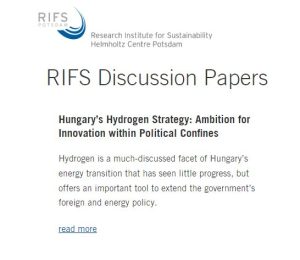Hydrogen is a much-discussed facet of Hungary’s energy transition that has seen little progress,but offers an important tool to extend the government’s foreign and energy policy. Policy-making in Hungary is highly centralised and government ambitions haveprioritised the continued role of nuclear power, natural gas, and a solar PV boom. These closely trace foreign policy priorities as well, given that the former two entrench relations with Russia, while the latter enhances self-reliance while allow-ing the country to meet EU renewable energy targets. A hydrogen economy supports such ambitions, while the government has also welcomed EU funds and foreign investment into novel (green) tech-nologies that increase the value added in the economy. Domestic demand offers a secondary, but none-theless important, push for the uptake of hydrogen in industry and transportation. Hungary’s case shows how pre-existing political economic confines shape the uptake of hydrogen, as governments and other key actors take action while disrupting pre-existing practices to the least extent possible.



